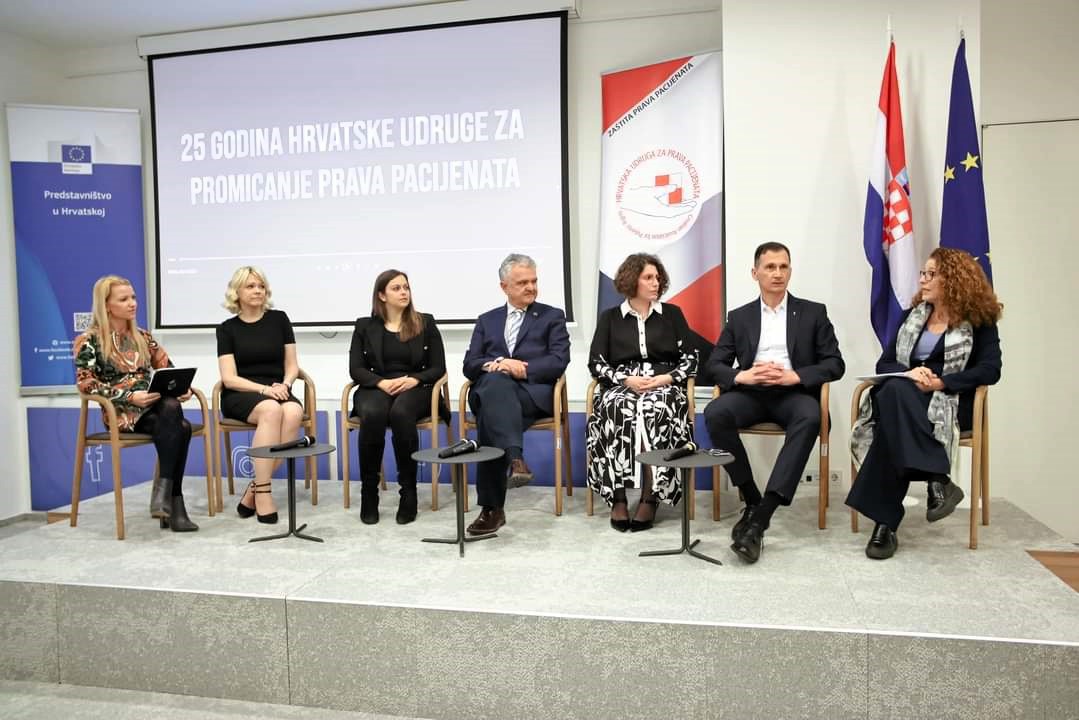On the occasion of the European Patients’ Rights Day, a conference was held on Thursday, 18 April 2024, at the Representation of the European Commission in Croatia. The event, organised by the Croatian Association for the Promotion of Patients’ Rights, also marked the 25th anniversary of the Association’s work.
Alongside Ombudswoman Tena Šimonović Einwalter, the panel on patients’ rights featured President of the Croatian Medical Association Željko Krznarić, Iva Kuliš from the Agency for Medicinal Products and Medical Devices (HALMED), campaign ambassador for “My Voice, My Right” Tatjana Cameron Tajči, Dragan Primorac and Ana Malbaša Major. The discussion was moderated by Association President Jasna Karačić Zanetti.
Ombudswoman Šimonović Einwalter presented the institution’s work in the field of patient rights protection, underlining that, unfortunately, significant obstacles remain in the exercise of the right to health. She noted that the highest number of complaints received by her Office continues to relate to the healthcare system. These complaints reveal that many citizens struggle to access healthcare—due to limited or entirely unavailable services, a shortage of physicians, administrative barriers, and often a lack of information provided to patients.
She also pointed to problems within the existing complaints system. Currently, complaints can be submitted under two laws: the Healthcare Act and the Act on the Protection of Patients’ Rights. This dual framework causes confusion for citizens, and two additional issues persist.
The first issue concerns the existing Healthcare Act and the lack of clarity regarding the criteria used by the competent Ministry of Health to determine when citizens’ complaints about the professional conduct of doctors are forwarded to the Croatian Medical Chamber (CMC), and when the health inspectorate instead conducts an inspection and, pursuant to Article 206 of the Healthcare Act, appoints experts to issue a professional opinion that can serve as the basis for further action.
According to available information, in most cases, complaints about medical expertise are forwarded directly to the CMC. In a smaller number of cases, the health inspectorate proceeds under Article 206. In all cases, it is essential that expert decisions on patient complaints are made in accordance with clearly defined procedures that ensure objectivity, independence, and appropriate accountability—something that requires clear criteria.
The second issue relates to the Act on the Protection of Patients’ Rights, under which county-level committees are established to protect patients’ rights. These committees are supposed to issue recommendations, proposals and warnings to competent state and local authorities, as well as to legal and natural persons, in cases where a violation of rights has been established. However, in practice, these committees do so in very few cases.
One of the recommendations in the Ombudswoman’s 2023 Annual Report, recently submitted to the Croatian Parliament, was addressed to the Ministry of Health, urging it to amend the Act on the Protection of Patients’ Rights by specifying which body is responsible for overseeing the work of county-level committees.
Other panel participants spoke about the development of personalised medicine, violations of patients’ rights resulting from medical errors, the importance of the safe use of medicines, and the role of the media in advocating for patients’ rights—particularly in the context of growing public mistrust in institutions, including those in the healthcare sector.
As part of the conference, the video campaign “My Voice, My Right” was also presented, aimed at raising awareness about the 14 rights enshrined in the European Charter of Patients’ Rights, with participation from public figures serving as campaign ambassadors.





